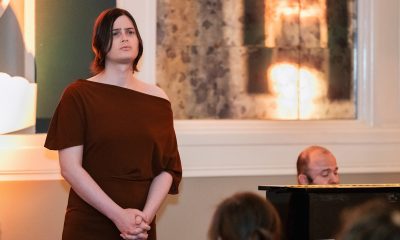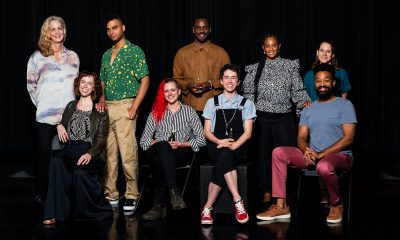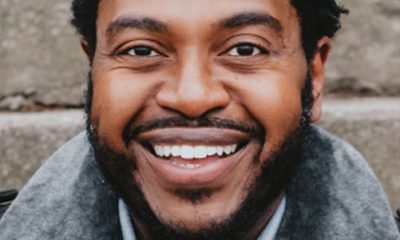Arts & Entertainment
In full ‘Force’
Washington National Opera’s modern production restores a Verdi classic
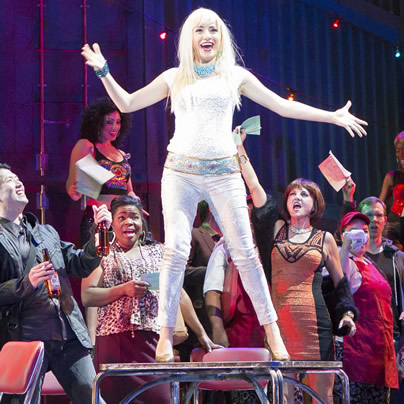
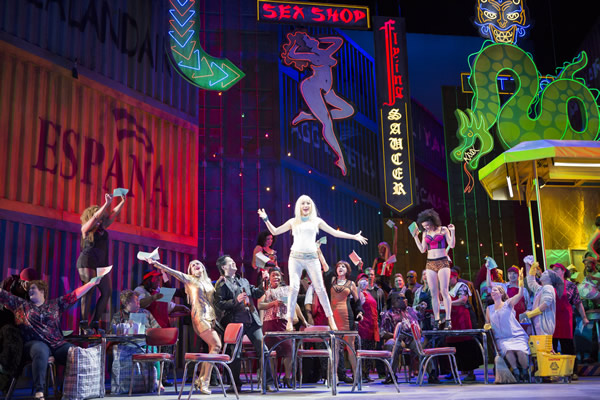
Washington National Opera’s Verdi reboot gives the show a bold, modern setting. (Photo by Scott Suchman; courtesy WNO)
‘The Force of Destiny’
Through Oct. 26
The Kennedy Center
2700 F St., NW
Tickets $25-$300
kennedy-center.org/wno
202-416-8500
As conductor Xian Zhang mounted the podium Saturday evening for the Washington National Opera’s opening night of “The Force of Destiny,” the audience seemed to lean in, eagerly anticipating the driving overture that is the work’s most recognizable calling card. Yet, only silence remained. The curtain rose on a dumb-show dinner scene in a luxurious home, where a family broke bread and a maid stood anxiously by the large window, looking out into the blackest of nights.
Like the unsuspecting characters of Giuseppe Verdi’s sweeping work “La Forza del Destino” (WNO oddly translates the title into English), the audience would have to wait for destiny to come to us on its own terms. Director Francesca Zambello’s creative opening gave the story an unexpected immediacy, especially as the tragic events surrounding the heroine Leonora (Adina Aaron) and her lover Don Alvaro (Giancarlo Monsalve) unfolded in the first scene. Once the die was cast, however, the overture blared from the pit as an interlude between the life the protagonists dreamed of and the tumultuously bloody years ahead.
Zambello, a lesbian, moved the drama from the mid-1800s to the present day, complete with signs advertising sex, pole dancers displaying their wares outside a club and costumes evoking a city’s downtrodden, but this change of scene isn’t done thoughtlessly to bring in new opera fans. It actually works — beautifully at times.
Leonora, costumed as a vagrant, flees her broken family home and the wrath of a brother hell-bent on killing her, and lands outside an urban monastery, with graffiti scrawled on its walls and a neon cross over the door. Yet, as she drops to her knees and begs God to rescue her from this miserable life, the plight of the modern-day heroine seems less antiquated and more real, reminding us of our own dark nights of the soul when we’ve turn to a God we may or may not believe in to see us through ‘til dawn.
The vision doesn’t always work seamlessly — penitent monks wandering through a raucous, sex-crazed street crowd seems more fitting for an earlier era — but the production takes what can be a tottering opera and restores it to a seat reserved for Verdi’s best musical and dramatic writing.
‘Forza’ is not an easy work to cast, given the intense demands for protagonists and chorus alike, but under Zhang’s evocative baton, the artists delivered crackling, if not always subtle, performances.
Aaron was an electrifying presence, her body trembling with pathos, almost as if she was unable to control the power coursing through her. Her final act aria, the famed “Pace, Pace, mio Dio,” was simply perfect in both vocal and dramatic delivery. It may have been opening night nerves, but elsewhere in the opera, she sometimes sped through passages that required focused negotiation between a marvelously dark chest voice and her more velvety middle register, and a couple of notes sounded a hair off-pitch. Hopefully, these kinks will iron themselves out, because her overall performance is spectacular.
The lower-voiced roles took home the prize among the men. Mark Delavan’s Carlo never seemed to flag over the course of a long evening, his rich tone creamy from bottom to top. Italian bass Enrico Iori was a sumptuously formidable, yet also delicately heartbreaking, Father Guardino, and the rousing chemistry between him and Aaron makes one wonder what the two could make of “Don Carlo.”
The dark tenor hero Don Alvaro is a complex role. His music often sits in places tenors would rather muscle through in order to sail onwards to their glorious high notes, and the character’s emotional journey is deliciously multifaceted. Monsalve delivered acting in spades, giving us a sexy and then tormented Alvaro, but his singing was uneven. He seemed capable of only two dynamic choices — shout and bellow — and while, when appropriate, those choices were lovely, they made for a loud night.
By the opera’s end, though, when death had claimed so many and forgiveness seemed like the frailest of hopes, it was Zambello who walked away with the crown for a production that not only made us listen, but also made us think.

Team DC, the umbrella organization for LGBTQ-friendly sports teams and leagues in the D.C. area, held its annual Night of Champions Awards Gala on Saturday, April 20 at the Hilton National Mall. The organization gave out scholarships to area LGBTQ student athletes as well as awards to the Different Drummers, Kelly Laczko of Duplex Diner, Stacy Smith of the Edmund Burke School, Bryan Frank of Triout, JC Adams of DCG Basketball and the DC Gay Flag Football League.
(Washington Blade photos by Michael Key)




















The 2024 National Cannabis Festival was held at the Fields at RFK Stadium on April 19-20.
(Washington Blade photos by Michael Key)
















Covering the @NatlCannaFest at RFK Stadium for @WashBlade . Stop by the LGBTQ+ booth and pick up a paper if you are here. pic.twitter.com/is7hnsaPns
— Michael Patrick Key (@MichaelKeyWB) April 20, 2024
Theater
‘Amm(i)gone’ explores family, queerness, and faith
A ‘fully autobiographical’ work from out artist Adil Mansoor

‘Amm(i)gone’
Thorough May 12
Woolly Mammoth Theatre
641 D St., N.W.
$60-$70
Woollymammoth.net
“Fully and utterly autobiographical.” That’s how Adil Mansoor describes “Amm(i)gone,” his one-man work currently playing at Woolly Mammoth Theatre.
Both created and performed by out artist Mansoor, it’s his story about inviting his Pakistani mother to translate Sophocles’s Greek tragedy “Antigone” into Urdu. Throughout the journey, there’s an exploration of family, queerness, and faith,as well as references to teachings from the Quran, and audio conversations with his Muslim mother.
Mansoor, 38, grew up in the suburbs of Chicago and is now based in Pittsburgh where he’s a busy theater maker. He’s also the founding member of Pittsburgh’s Hatch Arts Collective and the former artistic director of Dreams of Hope, an LGBTQ youth arts organization.
WASHINGTON BLADE: What spurred you to create “Amm(i)gone”?
ADIL MANSOOR: I was reading a translation of “Antigone” a few years back and found myself emotionally overwhelmed. A Theban princess buries her brother knowing it will cost her, her own life. It’s about a person for whom all aspirations are in the afterlife. And what does that do to the living when all of your hopes and dreams have to be reserved for the afterlife?
I found grant funding to pay my mom to do the translation. I wanted to engage in learning. I wanted to share theater but especially this ancient tragedy. My mother appreciated the characters were struggling between loving one another and their beliefs.
BLADE: Are you more director than actor?
MANSOOR: I’m primarily a director with an MFA in directing from Carnegie Mellon. I wrote, directed, and performed in this show, and had been working on it for four years. I’ve done different versions including Zoom. Woolly’s is a new production with the same team who’ve been involved since the beginning.
I love solo performance. I’ve produced and now teach solo performance and believe in its power. And I definitely lean toward “performance” and I haven’t “acted” since I was in college. I feel good on stage. I was a tour guide and do a lot of public speaking. I enjoy the attention.
BLADE: Describe your mom.
MANSOOR: My mom is a wonderfully devout Muslim, single mother, social worker who discovered my queerness on Google. And she prays for me.
She and I are similar, the way we look at things, the way we laugh. But different too. And those are among the questions I ask in this show. Our relationship is both beautiful and complicated.
BLADE: So, you weren’t exactly hiding your sexuality?
MANSOOR: In my mid-20s, I took time to talk with friends about our being queer with relation to our careers. My sexuality is essential to the work. As the artistic director at Dreams of Hope, part of the work was to model what it means to be public. If I’m in a room with queer and trans teenagers, part of what I’m doing is modeling queer adulthood. The way they see me in the world is part of what I’m putting out there. And I want that to be expansive and full.
So much of my work involves fundraising and being a face in schools. Being out is about making safe space for queer young folks.
BLADE: Have you encountered much Islamophobia?
MANSOOR: When 9/11 happened, I was a sophomore in high school, so yes. I faced a lot then and now. I’ve been egged on the street in the last four months. I see it in the classroom. It shows up in all sorts of ways.
BLADE: What prompted you to lead your creative life in Pittsburgh?
MANSOOR: I’ve been here for 14 years. I breathe with ease in Pittsburgh. The hills and the valleys and the rust of the city do something to me. It’s beautiful, it’ affordable, and there is support for local artists. There’s a lot of opportunity.
Still, the plan was to move to New York in September of 2020 but that was cancelled. Then the pandemic showed me that I could live in Pittsburgh and still have a nationally viable career.
BLADE: What are you trying to achieve with “Amm(i)gone”?
MANSOOR: What I’m sharing in the show is so very specific but I hear people from other backgrounds say I totally see my mom in that. My partner is Catholic and we share so much in relation to this.
I hope the work is embracing the fullness of queerness and how means so many things. And I hope the show makes audiences want to call their parents or squeeze their partners.

